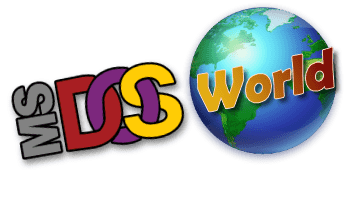
Lazy Mutt Games
MSDOS Online Games Selection
Current MSDOS Games Online
The shareware games in this section are exclusive Lazy Mutt Game MSDOS World selected games,
and come to you without advertisements or in game purchases. Each game has been hand selected
and tested to work with our Online DOSBox interface. We hope that you enjoy these retro blasts
from the past.
If you would like to download the full versions of these games a link to the Zip
file of each game will be located on the games page.
MSDOS Shareware games are for the PC or Mac desktop platforms
only. Since these games were developed before there were smartphones and tablets.
History of Shareware
Shareware is a type of proprietary software which is initially provided free of charge to
users, who are allowed and encouraged to make and share copies of the program. Shareware is
often offered as a download from a website or on a compact disc included with a magazine.
Shareware differs from open-source software, in which the source code is available for
anyone to inspect and alter; and freeware, which is software distributed at no cost to the
user but without source code being made available.
There are many types of shareware, and while they may not require an initial up-front
payment, many are intended to generate revenue in one way or another. Some limit use to
personal non-commercial purposes only, with purchase of a license required for use in a
business enterprise. The software itself may be limited in functionality or be time-limited,
or it may remind the user that payment would be appreciated.
In 1982, Andrew Fluegelman created a program for the IBM PC called PC-Talk, a
telecommunications program, and used the term freeware; he described it "as an experiment
in economics more than altruism". About the same time, Jim "Button" Knopf released PC-File,
a database program, calling it user-supported software. Not much later, Bob Wallace produced
PC-Write, a word processor, and called it shareware. Appearing in an episode of Horizon
titled Psychedelic Science originally broadcast 5 April 1998, Bob Wallace said the idea
for shareware came to him "to some extent as a result of my psychedelic experience".
In 1983 Jerry Pournelle wrote of "an increasingly popular variant" of free software
"that has no name, but works thus: 'If you like this, send me (the author) some money. I
prefer cash.'" In 1984, Softalk-PC magazine had a column, The Public Library, about such
software. Public domain is a misnomer for shareware, and Freeware was trademarked by
Fluegelman and could not be used legally by others, and User-Supported Software was too
cumbersome. So columnist Nelson Ford had a contest to come up with a better name.
The most popular name submitted was Shareware, which was being used by Wallace. However,
Wallace acknowledged that he got the term from an InfoWorld magazine column by that name in
the 1970s, and that he considered the name to be generic, so its use became established
over freeware and user-supported software.
From Wikipedia - https://en.wikipedia.org/wiki/Shareware
History of MSDOS
MS-DOS (acronym for Microsoft Disk Operating System) is an operating system for
x86-based personal computers mostly developed by Microsoft. Collectively, MS-DOS, its
rebranding as IBM PC DOS, and some operating systems attempting to be compatible with
MS-DOS, are sometimes referred to as "DOS" (which is also the generic acronym for disk
operating system). MS-DOS was the main operating system for IBM PC compatible personal
computers during the 1980s, from which point it was gradually superseded by operating
systems offering a graphical user interface (GUI), in various generations of the
graphical Microsoft Windows operating system.
IBM licensed and re-released it in 1981, as PC DOS 1.0 for use in its PCs. Although
MS-DOS and PC DOS were initially developed in parallel by Microsoft and IBM, the two
products diverged after twelve years, in 1993, with recognizable differences in
compatibility, syntax, and capabilities.
During its lifetime, several competing products were released for the x86 platform,
and MS-DOS went through eight versions, until development ceased in 2000. Initially,
MS-DOS was targeted at Intel 8086 processors running on computer hardware using floppy
disks to store and access not only the operating system, but application software and
user data as well. Progressive version releases delivered support for other mass
storage media in ever greater sizes and formats, along with added feature support for
newer processors and rapidly evolving computer architectures. Ultimately, it was the
key product in Microsoft's development from a programming language company to a diverse
software development firm, providing the company with essential revenue and marketing
resources. It was also the underlying basic operating system on which early versions of
Windows ran as a GUI. It is a flexible operating system, and consumes negligible
installation space.
From Wikipedia - https://en.wikipedia.org/wiki/MS-DOS
History of DOSBox
DOSBox is free software written primarily in C++ and distributed under the GNU
General Public License. DOSBox has been downloaded more than 34 million times since
its release on SourceForge in 2002.
A number of usability enhancements have been added to DOSBox beyond the core
function of emulating DOS. The added features include virtual hard drives, peer-to-peer
networking, screen capture and screencasting from the emulated screen.
More than nine years have passed between 2010's 0.74 and the 2019's latest version
0.74-3, "a security release" made in the absence of version 0.75, which "should have
been released by now, but some bugs took a lot longer than expected". But throughout
these years development has been ongoing in the SVN version. Forks such as DOSBox SVN
Daum and DOSBox SVN-lfn provide additional features, which include support for save
states and long filenames, while others such as DosBox-X add emulation for Japanese
systems like the NEC PC-98 and increase compatibility with various Demoscene productions.
A number of vintage DOS games have been commercially re-released to run on modern
operating systems by encapsulating them inside DOSBox.
From Wikipedia - https://en.wikipedia.org/wiki/DOSBox